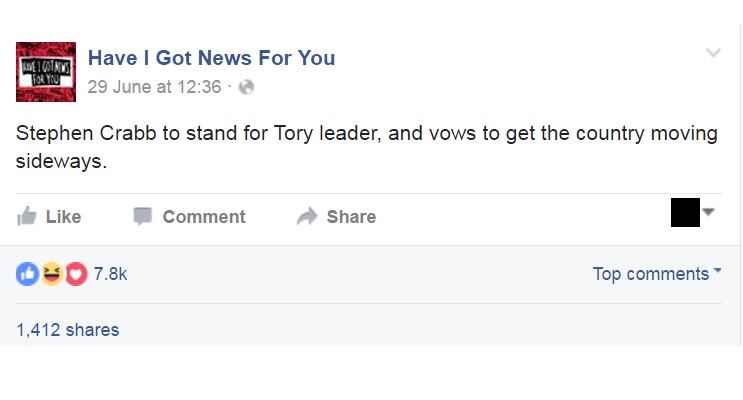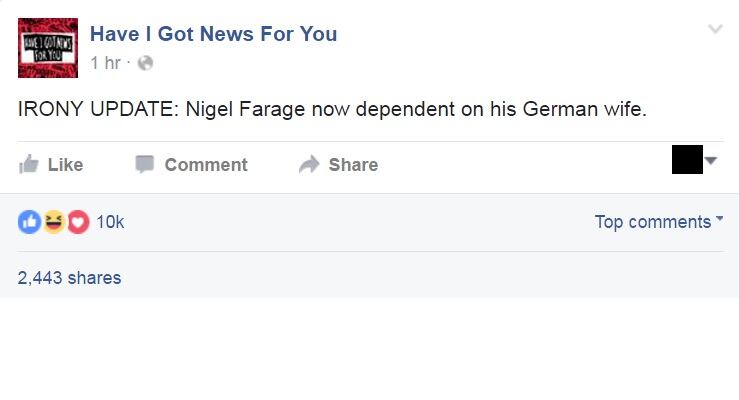A referendum was promised as part of David Cameron’s 2015 general election campaign for Conservative leadership, seen largely as a response to burgeoning support for the right wing Eurosceptic party the UK Independence Party (UKIP), which was carving off support traditionally reserved for the Conservative Party.
After months of fierce campaigning and public debate, whereby both camps were accused of spreading misinformation and fearmongering, the electorate of the UK voted to leave the European Union by 52% to 48% after 43 years of membership.
UKIP hailed this an Independence Day for the country and a victory of the “decent” underdog over big businesses and bloated financial institutions.
Why leave
One promise that tempted voters was that the (disputed) UK weekly bill of £350m (€413m) sent to the EU would be redirected to fund the UK’s struggling National Health Service (NHS) instead.
The Leave campaigners have since conceded this may not happen after all, and the money would likely be spread over many things.
Leave campaigners also said the move would give Britain back control of its borders.
UKIP posters widely compared to Nazi propaganda and condemned for inciting racial hatred (including a police charge), claimed our little island was so full to busting that people were literally falling off the cliffs of Dover into the sea with their omega-3 fortified fish 'n' chips in hand.
Far-right group and Leave supporter Britain First jumped on this bandwagon, posting videos of harassed-looking Latvians living in tents in the East Midlands. (Bloody foreigners, coming over here, stealing all our best camping spots.)
However EU officials have since confirmed that if the UK wants to negotiate free access to the EU market, it will have to agree to the free movement of people too. This will affect food and nutrition across the board.
While the European Commission has called for a speedy summoning and signing off of article 50 of the Lisbon Treaty needed to trigger official exit negotiations, political in-fighting has engulfed Westminster and Scotland’s parliament in Holyrood and a string of resignations means there aren’t all that many people left around to trigger it.
Political in-fighting
On the ruling right, David Cameron said he would be resigning as prime minister by the autumn after failing to secure a Remain vote.
Cabinet ministers are now scrambling to step into his shoes, with candidates likely to include current Home Secretary and Remain supporter Theresa May, Secretary of State for Justice, Lord Chancellor and co-convenor of the leave campaign Michael Gove, Remain-backer and Secretary of State for Work and Pensions Stephen Crabb, and Boris Johnson-backed Brexiteer, Energy minister Andrea Leadsom.

Chief Brexiteer, former mayor of London and MP for Uxbridge and South Ruislip, Boris Johnson, bowed out of the leadership battle much to everybody’s surprise, mainly because the general consensus was a chance of becoming the next PM was the only reason why he got out of bed to shout ‘Leave!’ in the first place.
Whoever does take over by September will be responsible for invoking article 50 (or not) and negotiating the UK through the so-called Brexit, if legal challenges to the validity of the referendum and widespread protest to the vote don't succeed in the meantime.
On the left, Labour party leader Jeremy Corbyn was accused of being too damp to lead the Leave campaign, and the Labour party, to victory.
Just four days after polling day, 23 of the 31 opposition party leaders had resigned and the following day 172 to 40 of his MPs voted that they had ‘no confidence’ in his leadership.
A leadership coup has ensued and shadow business secretary Angela Eagle is set to challenge Corbyn for top spot.
Meanwhile north of Hadrian's wall, since the Brexit result was largely down to voters from England and Wales and not Northern Ireland or Scotland, First Minister of Scotland and Scottish National Party (SNP) leader Nicola Sturgeon has threatened to block the move to keep the UK and therefore pro-Remain Scotland in the EU.
And because everybody loves a good referendum, she’s said she might call another one on Scottish independence from the UK too.
She says Brexit means circumstances have changed significantly since the Scottish people voted to stay in the UK by 55.3% in 2014 and basically if there’s anything that will push Scots into action, it’s the idea of being left alone with the English.
Fears have also been raised about what this will mean for pro-Remain Northern Ireland, which has only been peaceful since the 1990s.
Irish nationalist party Sinn Féin has since called for a poll on the reunification of Northern Ireland – a part of the UK – and the Republic of Ireland - not a part of the UK and therefore not about to leave the EU.
Basically because if there’s anything that will push the Irish into action, it’s the idea of being left alone with the English.
And what of the economy?
As results from the vote came in, suggesting a victory for the Leave campaign, the value of sterling dropped to a 31-year low on currency markets while the stock market also plunged to historic lows.
The following Monday, Cameron’s right hand man and Chancellor of the Exchequer George Osborne offered some soothing words to the market: The Bank of England is ready to provide £250bn (€294bn) of funds to ease the strain on banks.
So, not quite the victory over “the big merchant banks” as proclaimed by Farage then?
Meanwhile the communities that voted so overwhelmingly to leave the EU have asked for assurances that the funding they previously received from the EU will be matched by the UK government.
Perhaps though, if Nigel were to ask for us, the EU would let us keep those grants, which include a hole of about €3bn in food, nutrition and other research.
Last week he popped into the European Parliament to blow raspberries at all his doubters and tell them that he was going to throw a big Brexit party and they would NOT be invited.
Before stepping down from the podium he told his MEP colleagues: "I know that virtually none of you have ever done a proper job in your lives or worked in business or worked in trade or ever created a job."
Incidentally, Farage also resigned as UKIP leader this week and must therefore also find a proper job.

